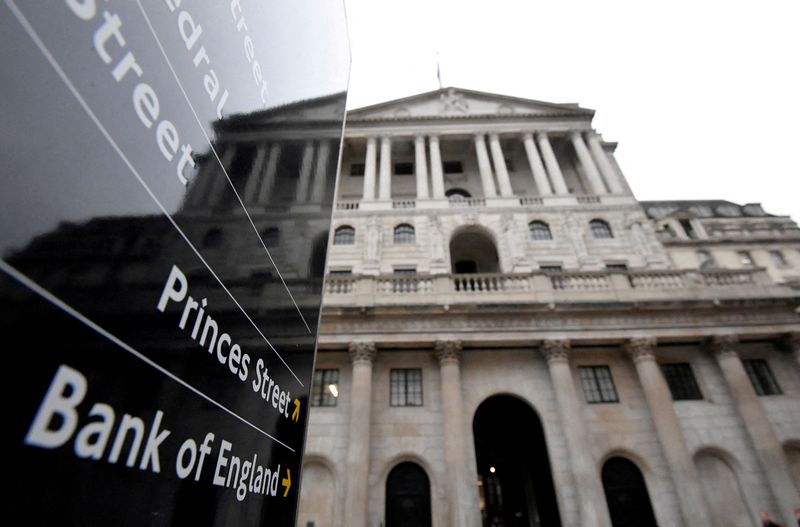Proactive Investors - The Bank of England is expected to increase interest rates for the 15th, and possibly final, time in this cycle next Thursday, although the decision is more finely balanced after weak economic data, according to economists.
The decision will come the day after the US Federal Reserve’s latest rate call and following the European Central Bank’s decision to lift interest rates by 25 basis points on Thursday.
While inflation figures are due the day before the BoE announces its latest decision, these are unlikely to be enough to change the mindset of policymakers.
One and done
Paul Dales chief UK economist at Capital Economics thinks that a 25 basis point rise in interest rates, from 5.25% to 5.50% “will be the last hike in this cycle and that sticky inflation will force the Bank to keep rates at their peak until late in 2024.”
Bank of America (NYSE:BAC) predicts an 8-1 vote in favour of a 25bp hike but added “skipping this month and revisiting the case for another hike in November, when the BoE will have a new set of forecasts and will have undertaken a review of the supply side of the economy, is far from unthinkable."
It expects “wage growth and inflation to slow between now and the November meeting, allowing the BoE to pause then.”
Martin Beck, chief economic advisor to the EY ITEM thinks the BoE’s Monetary Policy Committee seems “destined to go for number 15 in this month’s meeting.”
But he reckons recent economic data means that decision looks much more finely balanced than only a few weeks ago.
That data includes a worse-than-expected gross domestic product reading in July which showed the UK economy contracted by 0.5%, compared to City expectations for a 0.2% fall.
The UK service sector is slowing while the jobs market is showing signs of creaking with vacancies falling and unemployment rising.
The elephant(s) in the room remain stubborn wage growth while rising oil prices are adding fuel to the pressures faced by central banks.
Rising wages to seal the deal
Bank of America thinks as the BoE weighs conflicting evidence, “one number will trump the others.”
“Private sector ex-bonus pay growth has accelerated since the BoE's last meeting, exceeded their forecast, and sits at 8.1% yoy. That wage strength leads us to expect the BoE to hike 25bp next week, to 5.5%,” it said.
Beck noted “latest data haven’t been short of reasons to rein back rate-rising instincts.”
“Faced with the ambiguous message sent by recent economic data, the EY ITEM Club thinks there is a strong case for the MPC to adopt a ‘wait-and-see’ approach this month,” Beck added.
But he thinks the committee’s focus on rapid pay growth “will probably be enough to swing a majority on the MPC in favour of tightening policy again.”
He agrees this should be the last rise in the cycle.
Pantheon Macroeconomics puts the chances of a rate hike at 75% even though the inflation figures will precede the decision.
“The MPC will receive the CPI data on Monday, so policymakers will have ample time to digest the report's contents before casting their votes on Wednesday, with their decision announced on Thursday,” it pointed out.
How much will rising fuel costs lift inflation?
Inflation figures are obviously central to the BoE’s thinking and on Wednesday there will be further evidence as to whether the rate rising spree is acting to bring price growth close to its 2% target.
Pantheon thinks the headline rate of CPI inflation will rise to 7.1% in August, from 6.8% in July, matching the MPC's forecast in last month's Monetary Policy Report.
It sees motor fuel CPI inflation rising sharply in August but food and core goods CPI inflation falling significantly, reflecting the BRC's shop price index.
But Goldman Sachs (NYSE:GS) headline inflation to remain unchanged at 6.8% year-on-year with core inflation moderating to 6.7%, from 6.9% in July.
Within core inflation, it expects core goods inflation to decline by two tenths to 5.7%, and services inflation to decrease by a tenth to 7.3%.
Food, alcohol, and tobacco inflation will moderate to 12.7% from 13.2% in July but energy inflation will increase to negative 3.5% from negative 7.8% in July, as the weakness last month was driven largely by the decline in household energy bills and fuel prices picked up in August, it points out.
Goldman is sticking to its end-2023 core inflation forecast of 6.0% but has raised its headline inflation forecast slightly to 4.7% from 4.4%.
